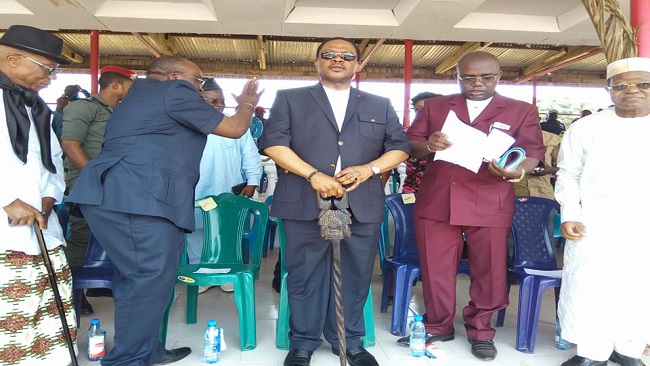Categories
Recent Posts
- Football: Dembele goal gives PSG narrow advantage over Arsenal in Champions League
- US: Trump addressing rally in Michigan as he marks 100 days in office
- Vatican: Conclave to elect new pope will start on May 7
- Namibian minister sacked after being accused of rape
- Dozens of African migrants killed in US strike on Yemen
Archives
- April 2025
- March 2025
- February 2025
- January 2025
- December 2024
- November 2024
- October 2024
- September 2024
- August 2024
- July 2024
- June 2024
- May 2024
- April 2024
- March 2024
- February 2024
- January 2024
- December 2023
- November 2023
- October 2023
- September 2023
- August 2023
- July 2023
- June 2023
- May 2023
- April 2023
- March 2023
- February 2023
- January 2023
- December 2022
- November 2022
- October 2022
- September 2022
- August 2022
- July 2022
- June 2022
- May 2022
- April 2022
- March 2022
- February 2022
- January 2022
- December 2021
- November 2021
- October 2021
- September 2021
- August 2021
- July 2021
- June 2021
- May 2021
- April 2021
- March 2021
- February 2021
- January 2021
- December 2020
- November 2020
- October 2020
- September 2020
- August 2020
- July 2020
- June 2020
- May 2020
- April 2020
- March 2020
- February 2020
- January 2020
- December 2019
- November 2019
- October 2019
- September 2019
- August 2019
- July 2019
- June 2019
- May 2019
- April 2019
- March 2019
- February 2019
- January 2019
- December 2018
- November 2018
- October 2018
- September 2018
- August 2018
- July 2018
- June 2018
- May 2018
- April 2018
- March 2018
- February 2018
- January 2018
- December 2017
- November 2017
- October 2017
- September 2017
- August 2017
- July 2017
- June 2017
- May 2017
- April 2017
- March 2017
- February 2017
- January 2017
- December 2016
- November 2016
- October 2016
- September 2016
- August 2016
- July 2016
- June 2016
Featured
Most Commented Posts
 4 Anglophone detainees killed in Yaounde
4 Anglophone detainees killed in Yaounde
18 comments Chantal Biya says she will return to Cameroon if General Ivo Yenwo, Martin Belinga Eboutou and Ferdinand Ngoh Ngoh are sacked
Chantal Biya says she will return to Cameroon if General Ivo Yenwo, Martin Belinga Eboutou and Ferdinand Ngoh Ngoh are sacked
13 comments The Anglophone Problem – When Facts don’t Lie
The Anglophone Problem – When Facts don’t Lie
12 comments Anglophone Nationalism: Barrister Eyambe says “hidden plans are at work”
Anglophone Nationalism: Barrister Eyambe says “hidden plans are at work”
12 comments Largest wave of arrest by BIR in Bamenda
Largest wave of arrest by BIR in Bamenda
10 comments
Latest Tweets
Featured
-

Football: Dembele goal gives PSG narrow advantage over Arsenal in Champions League
-

US: Trump addressing rally in Michigan as he marks 100 days in office
-

Vatican: Conclave to elect new pope will start on May 7
-

Namibian minister sacked after being accused of rape
-

Dozens of African migrants killed in US strike on Yemen
-

Manyu Division: A new path is possible
-

Who will be the next pope? Key candidates in an unpredictable process
© Cameroon Concord News 2025





7, December 2017
UN tells Cameroon to put an end to torture by security forces in the fight against Boko Haram 0
Cameroon must act swiftly on the recommendations published today by the UN Committee against Torture and put an end to the widespread use of torture by security forces fighting Boko Haram, Amnesty International said.
The Committee expressed deep concerns about the use of secret torture chambers documented by Amnesty International in July, and its failure to clarify whether investigations were being carried into these allegations, as well as other reports of killings of civilians and enforced disappearances.
“With the Committee against Torture now also demanding an end to the use of torture in Cameroon, it is becoming impossible for the world to ignore the widespread practice of torture in the country,” said Ilaria Allegrozzi, Amnesty International’s Lake Chad researcher.
“The clamour for justice is growing and Cameroonian authorities should respond by taking these reports of torture far more seriously and launching an independent and efficient investigation into these horrific practices.”
Based on submissions from organisations including Amnesty International, the UN Committee noted that large numbers of people from Cameroon’s Far North region are likely to have been held incommunicado and tortured by members of the military and the intelligence services in at least 20 illegal detention facilities between 2013 and 2017.
The Committee also raised concerns that this torture took place with the likely knowledge of senior BIR and intelligence officers at one military base, and that dozens of people may have died following torture and inhuman conditions of detention.
In its recommendations the Committee called on Cameroon to publish a declaration from the highest state level affirming an absolute prohibition on torture and other ill-treatment and put an end to the practice of incommunicado detention.
It also called for effective, independent and impartial investigations into all allegations of torture, incommunicado detention and death in custody, and for alleged perpetrators and accomplices of such acts, including those in command responsibility, be prosecuted and sentenced in proportion to the seriousness of the offences.
Elsewhere in its concluding observations, the UN Committee also echoed concerns raised by Amnesty International and others in relation to human rights violations committed in the Anglophone regions of the country, including by demanding an investigation into the deaths of at least 20 people killed in October in clashes between the security forces and protestors.
The Committee criticized the failure of Cameroon to provide information on the number of people still detained following protests in the regions, or whether investigations had been launched into the excessive use of force.
UN experts also noted their concerns that journalists such as RFI correspondent Ahmed Abba had been charged under counter-terrorism laws, and that some had been subjected to torture while in detention. The Committee also criticized the regular use of military courts in trials of civilians.
“The UN’s anti-torture experts have recognised that there is a major problem in Cameroon, and their warnings should be heeded. There should be no tolerance of human rights violations like torture, and we hope that the Cameroonian authorities and international community will respond to this report with the seriousness it deserves,” said Ilaria Allegrozzi.
Background
On 7-8 November, the Committee against Torture convened in Geneva, where among other things it completed a two-day review of Cameroon’s fifth periodic report on its implementation of the provisions of the Convention against Torture covering the period 2010-2015.
The Committee – which is comprised of 10 independent experts – engaged in a dialogue with the Cameroonian delegation which included representatives from the Ministry of Justice, the Ministry of Foreign Affairs, the National Police, and the Permanent Mission of Cameroon to the United Nations Office at Geneva. Cameroon is among the 162 state parties to the Convention against Torture and Other Cruel, Inhuman or Degrading Treatment or Punishment.
Source: Amnesty.org